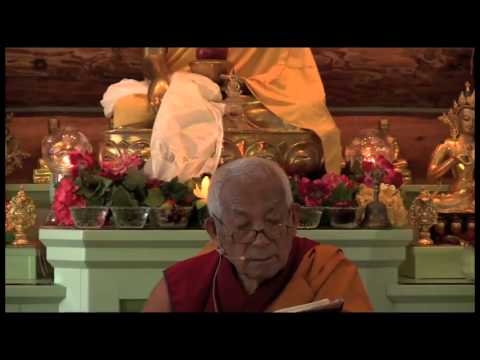Chapter 3: Verses 67–74
Chapter 3: Verses 67–74
Part of a series of teachings on Aryadeva’s 400 Stanzas on the Middle Way given on an annual basis by Geshe Yeshe Thabkhe from 2013-2017.
Motivation
- Dependent on causes and conditions, the three realms of existence and all phenomena are impermanent and give rise to suffering, i.e. they are impure and lack inherent existence
Verses 67-74
- Additional commentary on Verse 60
- How our mind mistakenly superimposes nonexistent qualities on the body
- Refuting the idea that the body is clean because others take pride in it or because it is easy to clean it or make it beautiful
- There is nothing which is a definitive cause of desire
Questions and answers
- Definitions of a sutra
- Relationship between the four aspects of the Four Noble Truths and the 400 Stanzas
- Two meanings of impurity
Geshe Yeshe Thabkhe
Geshe Yeshe Thabkhe was born in 1930 in Lhokha, Central Tibet and became a monk at the age of 13. After completing his studies at Drepung Loseling Monastery in 1969, he was awarded Geshe Lharampa, the highest degree in the Geluk School of Tibetan Buddhism. He is an emeritus professor at the Central Institute of Higher Tibetan Studies and an eminent scholar of both Madhyamaka and Indian Buddhist studies. His works include Hindi translations of The Essence of Good Explanation of Definitive and Interpretable Meanings by Lama Tsongkhapa and Kamalasila's commentary on the Rice Seedling Sutra. His own commentary, The Rice Seedling Sutra: Buddha’s Teachings on Dependent Arising, was translated into English by Joshua and Diana Cutler and published by Wisdom Publications. Geshela has facilitated many research works, such as a complete translation of Tsongkhapa’s The Great Treatise on the Stages of the Path to Enlightenment, a major project undertaken by the Tibetan Buddhist Learning Center in New Jersey where he teaches regularly.


